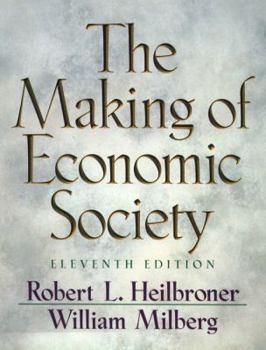The Making of Economic Society
Select Format
Select Condition 
Book Overview
With its roots in history and eyes on the future, this book traces the development of our economic society from the Middle Ages to the present, offering a balanced perspective of why our economy is... This description may be from another edition of this product.
Format:Paperback
Language:English
ISBN:0130910503
ISBN13:9780130910509
Release Date:January 2001
Publisher:Prentice Hall
Length:206 Pages
Weight:0.75 lbs.
Dimensions:0.3" x 7.1" x 9.2"
Customer Reviews
5 ratings
no title
Published by Thriftbooks.com User , 15 years ago
This book was a perfect price! Much cheaper than anywhere else. Also, the book came right on time! It even arrived before the date I was given. So, I was completely satisfied!
Good, but not as good as "Worldly Philosophers"
Published by Thriftbooks.com User , 17 years ago
I'd enjoyed Heilbroner's "Worldly Philosophers" so much that I purchased this title thinking it would be its equal, but sadly that was not the case. That's not to say that "Making of Economic Society" is a bad book or not worth the read, it's just that this book should be read before "Worldly Philosophers" or simply omitted as much of what was put forward in "Worldly Philosophers" is repeated here. Reading the two in the order I did is akin to drinking a glass of merlot and then a glass of chardonnay; its hard to taste the chardonnay is the prior merlot lingers on your palate. Not to mention Heilbroner's conscious or unconscious cribbing from "Worldly Philosophers" leaves you feeling like you've somehow read this all before. The end result is little that is new between the two rendering it down to a matter of personal preference between the two and my own vote is for the much larger, more detailed "Worldly Philosophers" and my own advice is to skip directly to that over this title.
Too expensive, but good
Published by Thriftbooks.com User , 19 years ago
This is an excellent book. The price is simply outrageous, though. Over $50 for a thin paperback? My consolation is that I should be able to get a decent price for it when I sell it after my economics class is over.
How did market society come to be?
Published by Thriftbooks.com User , 20 years ago
This book examines the transformation of traditional society into market society: the necessary pre-conditions and steps. The author reminds us that, despite the material advances of modern society, some key economic ideas still apply. All societies must be organized for the material survival of its members. The inter-dependencies among societal members in simpler societies have not been eliminated in market societies, despite the hyping of the independent, self-maximizer by modern theorists; in fact, the complexities of modern societies may well create more dependence, not less. And market societies do have some inherent problems.The author points out that any society must have a coherent system for producing useful goods and services and then distributing them in a manner sufficient for society's perpetuation. Man has relied upon combinations of tradition, command, and markets to solve those production and distribution problems. Tradition uses time-honored methods of work, "allocated by heredity," which are reinforced by "law, custom, and belief." Change and competitiveness are not tolerated. Command is authoritarian control of economies and is mostly associated with economies operating in rapid catch-up mode, such as the Soviet Union. However, even democracies use elements of command during periods of crisis. In market societies, the aggregation of supply and demand guide economic functioning with no distinct center of control or allegiance to past practices. Manorial estates and the guilds dominated life in the Middle Ages along with the Church, but the author points to small beginnings of a more commercial world. Itinerant merchants established a small niche for commercial activity in some urban areas. The more successful of them came to be key financiers of monarchs keen on expanding their authority. The gold and silver realized from 16th century New World expeditions stimulated commercial activity. Calvinism, in contrast to the Catholic Church, sanctified hard work and the accumulation of wealth as an indicator of spiritual worthiness. Gradually, feudal society became more reliant upon money as a basis of social exchange. No longer were manorial lords obligated for the overall well being of serfs. The displacement of peasants by the enclosure movements was justified by the opportunities for the landed aristocracy to use their estates as sources of cash revenue. The author identifies several changes that are necessary for a market economy to emerge. Virtually every task, good, or service has a monetary reward. The anticipation of financial reward guides such decisions as where to labor or what to produce. A society of contracts supercedes a society of status and traditional social bonds. With those changes, a certain amount of social uncertainty is introduced. Yet a market society is not without its own forms of control. The competitions of seller versus seller and buyer versus seller are constraining forces on economic behavior. Generally
Good, concise introduction for undergrads
Published by Thriftbooks.com User , 23 years ago
This is an excellent introduction to Economic History for undergraduate students. It is concise and well-written, full of poignant examples, tracing economic organization from the Middle Ages through the present. The chapter summaries and discussion questions at the end of each chapter are very useful for both the student and the professor. The brevity of the book leaves open the possibility of including related academic articles or even other textbooks in the syllabus. The main disappointment is that the nineteenth century--which was full of economic, social, and political change--is basically ignored. The content jumps from the Industrial Revolution to the beginning of the twentieth century. The traditional Euro-American egocentrism is also present.






